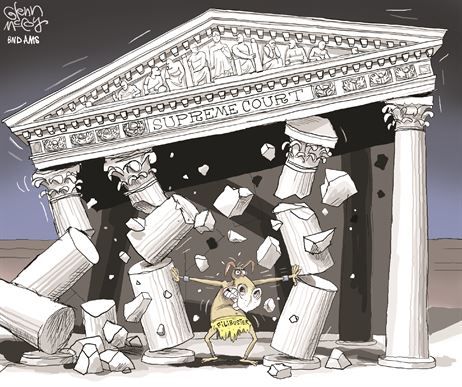For perspective, Democrats call Gorsuch sitting in a "stolen seat" They count on the ignorance of voters
Flashback: Obama Tried to Filibuster Bush’s Supreme Court Pick . . . "While Obama did criticize "the merits of a filibuster," Obama was firm in his support for filibustering Alito. Then-Obama spokesman Robert Gibbs doubled down on this, telling the Chicago Tribune that Obama views Alito as "a bad addition to the Supreme Court." Kerry was thrilled, and commended Obama in a statement for "taking a stand on principle." Alito ultimately was confirmed by the Senate. " . . .
Later on, Mr. Obama would regret his choice. Maybe that is when he learned to dither endlessly before making a decision.
. . . "Conservatives have seized on Obama’s filibuster vote to accuse him of hypocrisy for criticizing Republicans for saying the next president, and not Obama, should nominate Scalia’s successor. " . . .
The Federalist: There’s Ample Precedent For Rejecting Lame Duck Supreme Court Nominees "Historically, many Supreme Court nominations made in a President’s final year in office are rejected by the Senate. That started with John Quincy Adams and last occurred to Lyndon B. Johnson." . . .

Next comes the main point:

. . . "Scalia died on February 13, 2016, and President Obama nominated Garland to take his place. However, Senate Majority Leader Mitch McConnell (R., Ky.) led Senate Republicans in holding the seat open until after the 2016 election.
"The strategy paid off when Trump defeated Democrat Hillary Clinton, allowing him to nominate Gorsuch instead.
"Liberals took to Twitter to share their anger about the "stolen seat.' " . . .
Flashback: Obama Tried to Filibuster Bush’s Supreme Court Pick . . . "While Obama did criticize "the merits of a filibuster," Obama was firm in his support for filibustering Alito. Then-Obama spokesman Robert Gibbs doubled down on this, telling the Chicago Tribune that Obama views Alito as "a bad addition to the Supreme Court." Kerry was thrilled, and commended Obama in a statement for "taking a stand on principle." Alito ultimately was confirmed by the Senate. " . . .
Later on, Mr. Obama would regret his choice. Maybe that is when he learned to dither endlessly before making a decision.
. . . "Conservatives have seized on Obama’s filibuster vote to accuse him of hypocrisy for criticizing Republicans for saying the next president, and not Obama, should nominate Scalia’s successor. " . . .
The Federalist: There’s Ample Precedent For Rejecting Lame Duck Supreme Court Nominees "Historically, many Supreme Court nominations made in a President’s final year in office are rejected by the Senate. That started with John Quincy Adams and last occurred to Lyndon B. Johnson." . . .
Vox: The strongest Republican arguments for blocking President Obama's Supreme Court pick "Democrats pioneered the art, first, of blocking judicial appointees, and, second, of ramming judicial appointees down the minority’s throat at the expense of the filibuster," writes Mario Loyola in a National Review post titled, "Obama has poisoned the well for Scalia's replacement this year."
This is also why some conservative writers have pointed to votes that, on the surface, appear to have nothing to do with the Supreme Court nomination. In Commentary, Jonathan Tobin notes that Senate Democrats don't always act "so punctilious about allowing votes about other important matters."
. . . " 'In September 2015, 42 Senate Democrats voted to filibuster the approval process for the Iran nuclear deal. Even though all of them had voted for the bill that created that upside down treaty ratification process ... they denied the Senate that privilege," Tobin writes. "They cared nothing for the Constitutional niceties then.' " . . .

Steve Bakke in USA Today: Republican Party didn't start Supreme Court fight
Senate Minority Leader Chuck Schumer would have blocked a vote by using the filibuster. He claims this “stonewalling” started in 2016 when the Republicans refused to have a vote on Barack Obama’s nominee Merrick Garland. A review of history corrects that falsehood:
- In 1987, Robert Bork, a Reagan nominee, was denied confirmation. His reputation was brutally pilloried.
- In 1992, then-Sen. Joe Biden clearly outlined the reasons why the Senate wouldn’t consider a George H.W. Bush nomination in Bush’s last year in office.
- In 2001, during George W. Bush’s administration, Sen. Schumer and others changed the ground rules for systematically using the filibuster to block Supreme Court nominees.
- In 2006, then-Sen. Obama publicly supported a filibuster to block confirmation of Justice Samuel Alito.
- In 2007, 19 months before the end of George W. Bush’s term, Sen. Schumer declared that the lame-duck president wouldn’t get nominees through the Democratic Senate, “except in extraordinary circumstances.”



No comments:
Post a Comment